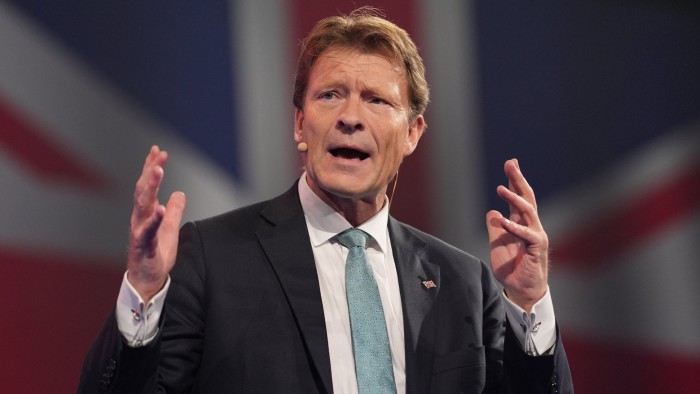Stay informed with free updates
Simply sign up to the Oil & Gas industry myFT Digest — delivered directly to your inbox.
Reform UK is trying to woo oil and gas companies with a promise to slash taxes and regulation if Nigel Farage’s party sweeps to power — though it will demand equity stakes in North Sea drilling projects in return.
Richard Tice, the deputy leader of the populist party, has approached a number of energy executives in recent weeks seeking support for Reform, promising a “day one” assault on net zero policies that includes reversing restrictions on new oil and gas exploration.
The party could immediately announce billions of pounds of new hydrocarbon investments if elected, he told the industry leaders. The next UK general election must be held by 2029.
Reform’s plan would see taxpayers take an equity stake in oil and gas ventures — the latest flirtation by the party with state ownership of national assets, as it increasingly adopts policy positions more typically associated with the left.
Farage and Tice have led the EU-sceptic party’s recent pivot away from focusing on Brexit to campaigning on the twin pillars of cutting immigration and opposing “net zero” energy policies.
The approach to independent oil and gas executives also demonstrates the party’s fledgling attempt to build relationships with established businesses, as it seeks to shore up its poll-leading position as a realistic contender for power.
One energy executive said the industry “may be concerned about anything that looks like nationalisation or state ownership of privately funded infrastructure projects”.
But they added that Reform’s “charm offensive” was “intriguing” for business, “with promises of tax breaks and regulatory reform that borrow from the Trump playbook”.
He added: “Reform are positioning themselves early as the party of business, but energy companies will not nail their colours to the mast so far out from the next election.”
Tice confirmed he had started meeting onshore and offshore oil and gas executives in recent weeks, adding that he views it as a “tragedy” that many companies are winding down their investments due to windfall taxes imposed by the previous Conservative and current Labour governments.
“I’m urging them not to give up,” Tice told the Financial Times. “There’s about to be a sea change in less than four years,” he said, adding that these companies “should be getting their licence applications ready for Reform to fast-track when it comes into government”.
He added: “I want these firms to know they are working with a shadow government that is willing to tick the box as soon as we get in.”
Industry executives in the UK have taken a cautious approach to the party so far, with many still viewing it as a start-up built on Farage’s popularity without the necessary experience or infrastructure to mount a sustained political challenge.
They are also concerned about an overly aggressive campaign against net zero, given some oil companies also have renewable energy and carbon capture and storage investments.
One executive told the FT that Reform was still seen by many in the sector as “one good funeral away from oblivion”, a reference to Farage’s outsized role in the party he founded.
“By now they should have: a policy unit staffed by informed wonks, a national infrastructure for disseminating policy and holding the party line, and a means to keep the leadership accountable,” the executive added. “Instead they look like a 1990s PR firm — one man and his dog.”
Farage and Tice once backed more conservative economic policies but have pivoted towards more classically leftwing economic stances to help bolster support in Brexit-supporting areas, many of which are more heavily dependent on government support.
They are targeting so-called “left behind” voters often in economically struggling towns outside of London.
Tice told the FT there were two options a Reform government could take to secure an equity stake in oil and gas investment.
The first would be requiring a stake in exchange for granting a licence, and the second would be “investing hard equity”, for example by offering upfront investment to drill in riskier, untapped locations, in exchange for a larger stake.
“We can completely move away from the windfall tax idea because taxpayers will be getting a slug of the profits,” he said. “We will be accused of picking winners, and yes I am picking winners. Oil and gas companies have been huge winners for decades.”





